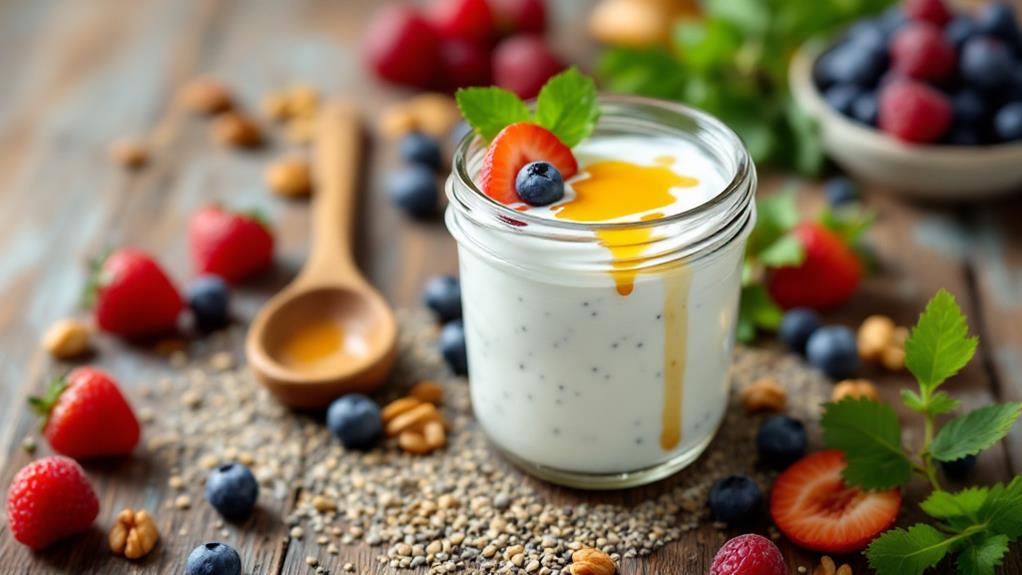Can Iron-Rich Foods Make You Smarter? The Link Between Iron and Brain Health

Eating iron-rich foods can make a big difference in your brain health and cognitive abilities. Iron plays an essential role in brain development, neurotransmitter production, and supporting memory and mood. A deficiency can lead to cognitive impairments and mood issues, but getting enough iron can improve attention, memory, and even elevate test scores. Foods like lean meats, legumes, and dark leafy greens are excellent sources of iron. Pairing them with vitamin C-rich foods increases absorption, enhancing benefits. Ensuring adequate iron intake across all life stages supports both physical and mental well-being. Uncover how these foods can sharpen your brain.
Importance of Iron for Cognition
In the domain of cognitive health, iron plays a significant role that you can't ignore. It's essential for brain development, especially during critical periods like pregnancy and infancy. If you're not getting enough iron during these times, it can lead to long-term cognitive impairments in children, including lower IQ scores. This mineral's importance doesn't stop in childhood—maintaining adequate iron levels throughout life is fundamental for good cognitive performance.
The hippocampus, the part of your brain responsible for memory and learning, is particularly vulnerable when iron is deficient. Without sufficient iron, your ability to form memories and perform cognitive tasks can be compromised. Studies have shown that older adults with higher iron levels in their brains tend to perform better cognitively. So, ensuring you have enough iron is vital for maintaining sharpness and mental agility as you grow older.
To elevate your iron levels and support cognitive health, consider incorporating iron-rich foods into your diet. Lean meats, legumes, and fortified cereals are excellent choices. These foods can help improve your attention and concentration, contributing to enhanced cognitive performance and brain development. Prioritize iron to keep your brain functioning at its best.
Iron's Role in Neurotransmitter Production
In regards to neurotransmitter production, iron stands as an fundamental element. It plays a significant role in creating neurotransmitters like dopamine, serotonin, and norepinephrine, which are imperative for neuron communication and general brain health. When your iron levels are sufficient, these neurotransmitters function effectively, supporting your mood, learning, memory, and cognitive abilities. However, low iron levels can impair their synthesis, negatively affecting your mood and cognitive performance.
Iron's importance doesn't stop there. It also influences the activity of enzymes involved in neurotransmitter metabolism, which are critical for learning and memory processes. Studies have shown that when your iron levels drop, you may experience decreased attention span and cognitive performance, impacting both children and adults.
To understand iron's impact on neurotransmitter production and brain health, consider these points:
- Iron and Enzymes: Iron supports the enzymes vital for neurotransmitter metabolism, enhancing learning and memory.
- Mood and Cognition: Adequate iron levels help maintain mood stability and cognitive abilities.
- Myelin Development: Iron aids in forming myelin, necessary for effective neurotransmission and general brain health.
Maintaining healthy iron levels is key to optimal neurotransmitter production and brain function.
Effects of Iron Deficiency on Brain Health
A lack of iron can greatly impact brain health, particularly during important developmental stages. Iron deficiency in infants isn't just a minor issue; it can lead to significant cognitive impairments. Iron plays a key role in neurotransmitter production and brain development, so when you're not getting enough, it can severely affect learning and memory capabilities. Studies show that chronic iron deficiency can result in deficits in both motor and cognitive functions, making it harder for you to perform tasks that require concentration and coordination.
If you're pregnant, the iron levels you maintain can also affect your baby's cognitive health. Infants born to anemic mothers often score lower on cognitive tests, highlighting the significance of adequate iron intake during pregnancy. These early deficiencies can have long-lasting effects, with potential deficits persisting into childhood and beyond. Symptoms like irritability and lack of appetite not only indicate iron deficiency but can also further hinder cognitive development. It's important to verify you're getting enough iron to support ideal brain health, especially during critical periods of brain growth. Without it, both short-term and long-term cognitive impairments can occur, underscoring iron's significant role.
Top Iron-Rich Foods to Include
Understanding the impact of iron deficiency on brain health highlights the significance of incorporating iron-rich foods into your diet. Increasing your iron stores can assist in the production of brain chemicals that support cognitive functions. Here are some top iron-rich foods to reflect on:
- Lean meats: Chicken and turkey are excellent sources of heme iron, which your body absorbs more effectively than the non-heme iron found in plant sources. Including these in your meals can help maintain adequate iron levels, vital for brain health.
- Iron-fortified cereals: These cereals offer a convenient way to raise your dietary iron intake, providing between 4.5 to 18 mg of iron per serving. They're a simple addition to your breakfast routine that can greatly affect your iron stores.
- Legumes and dark leafy greens: Beans, lentils, spinach, and kale are rich in non-heme iron, offering around 2-6 mg per cooked cup. Pairing these with vitamin C-rich foods like citrus fruits or bell peppers can improve non-heme iron absorption, making them even more advantageous.
Incorporating these foods into your diet can help support your brain's health by maintaining ideal iron levels and promoting the production of vital brain chemicals.
Enhancing Iron Absorption Naturally

Enhancing your iron absorption naturally can make a significant difference in maintaining healthy iron levels. By focusing on how you combine foods, you can amplify the benefits of iron-rich foods and support brain iron levels. Start by pairing vitamin C-rich foods with plant-based iron sources. For example, enjoy spinach with oranges or bell peppers, as vitamin C enhances non-heme iron absorption.
Cooking with cast-iron cookware is another simple strategy. As you prepare meals, small amounts of iron leach into the food, increasing its iron content. This method is particularly beneficial if you're iron-deficient and looking to elevate your intake effortlessly.
Including heme iron sources, such as lean meats and fish, in your diet is also effective. Heme iron is more readily absorbed by your body than non-heme iron, improving general iron absorption. Meanwhile, fermented foods like sauerkraut and kimchi are great for gut health, promoting nutrient absorption, including iron, by maintaining a healthy intestinal environment.
Iron's Impact on Mood and Behavior
In recent years, the link between iron and mood has become increasingly evident. Iron plays a vital role in neurotransmitter production, which directly impacts your mood and behavior. When you're dealing with iron deficiency, you might experience mood disturbances and increased irritability, especially in infants and children. This deficiency can lead to cognitive impairments and behavioral issues, emphasizing how important iron is for emotional regulation.
Consider these impacts of iron deficiency:
- Infants with iron-deficiency anemia often show increased fussiness and decreased appetite, affecting their development and mood stability.
- Children with low iron levels may struggle with attention and concentration, influencing their academic performance.
- Iron supplementation in deficient populations has shown improvements in mood and behavior, underscoring its significance in mental health.
When you guarantee adequate iron intake, you're supporting not just physical health but mental well-being too. Research indicates that maintaining proper iron levels can improve attention and concentration, leading to better academic outcomes for children. So, if you or your loved ones are experiencing mood disturbances or cognitive challenges, it's worth considering if iron deficiency could be a contributing factor.
Iron Needs Across Life Stages

As you consider the significant role iron plays in mood and behavior, it's just as vital to recognize that iron needs vary across different phases of life. Infants, for instance, require a daily iron intake of 0.27 mg/kg. Exclusive breastfeeding is recommended during the initial year to prevent deficiency and support early brain iron accumulation. As children grow, their iron needs change. Kids from 1-3 require about 7 mg of iron daily to support their rapid growth and cognitive development.
Entering adolescence, iron needs increase again. Girls need around 15 mg per day due to growth spurts and menstruation, while boys require about 11 mg. This period of life is significant for brain iron accumulation, which supports ongoing development. For adults, iron intake varies by gender and life phase. Men should aim for 8 mg daily, while women need 18 mg until menopause, after which their requirement drops to 8 mg.
Pregnancy is another life phase with heightened iron needs. Pregnant women need about 27 mg daily to support fetal development and increased blood volume. Understanding these iron needs helps guarantee your brain and body function effectively across every life phase.
Scientific Evidence Linking Iron to Intelligence
Iron's role in brain health is undeniable, particularly regarding intelligence and cognitive functions. Iron is critical for neurotransmitter production, and a deficiency can lead to cognitive impairments and lower IQ scores, especially in children. Research highlights how iron deficiency during infancy and early childhood can cause long-term developmental delays. This is because iron is fundamental for brain maturation, which directly impacts cognitive abilities. When you guarantee adequate iron intake, you're supporting your child's brain development and enhancing their learning capabilities.
Let's break down the scientific evidence:
- Cognitive Performance: Adequate iron levels are linked to improved attention, memory, and general cognitive performance, particularly in early childhood. This is essential for their developmental years.
- Developmental Delays: Infants lacking iron may face long-term cognitive challenges. Iron is critical during brain maturation, affecting how well your child develops intellectually.
- Dietary Impact: Longitudinal studies indicate that children with higher iron intake perform better on cognitive tests. This underscores the significance of incorporating iron-rich foods, like lean meats and legumes, into their diet.
Balancing Iron Intake Safely

In relation to maintaining ideal brain health, balancing iron intake safely is vital. Iron plays a significant role in cognitive function by facilitating neurotransmitter production, directly influencing your mood and learning abilities. Iron deficiency, particularly in infants and young children, can lead to cognitive impairments and developmental delays. Therefore, ensuring an adequate intake of iron-rich foods is essential for promoting healthy brain development.
To maintain optimal iron levels, incorporate foods like lean meats, iron-fortified cereals, legumes, and dark leafy greens into your diet. These foods provide a natural source of iron necessary for brain health. To maximize your body's ability to absorb iron, pair these foods with sources of vitamin C, such as citrus fruits, tomatoes, or bell peppers. This combination helps improve iron absorption and can effectively prevent deficiency.
However, monitoring your iron intake is just as significant as ensuring you get enough. Both iron deficiency and excess can adversely affect your health. Before starting any iron supplements, consult with a healthcare provider to tailor your iron intake to your specific needs, ensuring you maintain a safe balance for optimal brain health.
Lifestyle Tips for Optimal Brain Health
To cultivate ideal brain health, consider incorporating lifestyle habits that support cognitive function and well-being. Begin by focusing on your diet. Including iron-rich foods like lean meats, beans, and dark leafy greens can improve neurotransmitter production and enhance cognitive function. Pair these with vitamin C-rich foods, such as citrus fruits or bell peppers, to optimize iron absorption, further benefiting your brain health.
Aside from diet, staying hydrated is essential. Drinking enough water throughout the day helps maintain cognitive function, as dehydration can impair concentration and memory. Regular physical exercise also plays an important role in brain health. It increases blood flow to the brain and supports the growth of new brain cells, improving cognitive function over time.
Consider these actionable steps to optimize your brain health:
- Incorporate Iron-Rich Foods: Add lean meats, beans, and dark leafy greens to your meals. Improve iron absorption by pairing them with vitamin C sources.
- Stay Hydrated: Aim for regular water intake to support concentration and memory.
- Exercise Regularly: Engage in activities that enhance blood flow to the brain, fostering cognitive growth and health.




